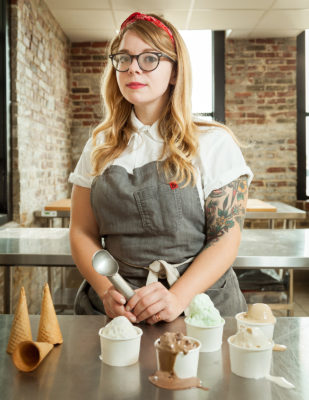
While old-fashioned ice cream parlors might be stationary, The Parlor Ice Cream Co. is anything but. Nevertheless, the dessert startup has quickly become one of Allston’s sweetest fixtures.
Since August, Parlor has been popping up at Allston’s Continuum on Wednesday nights. Recently, they announced that they’ll be extending their run there through Sep. 27.
“We have actually sold out almost every week that we’ve been there throughout August and September,” said Jacqueline Dole, founder of Parlor. “It started off with passersby and people coming home … Now, people really look forward Wednesdays, and they’ll actually stock up their freezers for the whole week.”
Dole said Parlor’s continual success in Allston prompted their decision to extend the pop-up series.
“The Aeronaut Beer Garden is right next door. There’s a lot of great food trucks that go there and a lot of really good savory options,” Dole said. “But once people have a couple beers, there’s always room for ice cream.”
Dole, who said she had years of culinary experience prior to founding Parlor, said her inspiration for creating the company was born from a love for ice cream and an apparent gap in Boston’s food scene.
“I was a pastry chef around Boston for several years, and I really loved making ice cream. That was always my favorite part of the job,” Dole said, “And I noticed there was a lack of quality, small batch ice cream in Boston, so I founded Parlor to help change that.”
Dole explained that small batch ice cream is produced in more limited quantities and with less time between production and consumption.
“We spin everything custom. Everything’s done to order,” Dole said. “So, you know, all of our ice cream is hyper-fresh, and whatever we bring for catering was made no more than 72 hours before serving.”
Dole said Parlor’s small-batch sizes enable the company to experiment with unique flavors and seasonal produce.
“For the fall, we’re doing a couple autumnal flavors,” Dole said. “We have a sweet potato and marshmallow swirl … And then we also are doing a miso caramel apple.”
Alexis Cervasio, founder of East Boston Oysters — one of Parlor’s business partners — also commented on Parlor’s creativity in recipes. When Cervasio worked with Dole, she said they came up with unusual flavors including pretzels and potato chips mixed into chocolate ice cream.
“We are two small businesses completely supporting each others ‘think-outside-the-square’ mentality,” Cervasio wrote in an email. “Her enthusiasm and creativity is evident as soon as you taste a spoonful … She is so willing to take her flavors to another level and that’s what makes her and her brand so important and so relevant.”
Despite their success, Parlor has yet to establish a permanent location, choosing to focus on growth in a less conventional way.
“We do not have a brick-and-mortar. We are an event-based business,” Dole said. “Rather than focusing on a storefront, we’re actually going a little bit bigger picture, and we’re getting pints into different markets in the Boston area.”
Dole said Parlor has several confirmed locations in Boston, which should be stocking Parlor’s pints soon, possibly within the next month.
While she feels pop-ups are often given less credibility in the business community, Parlor’s decision to avoid a brick-and-mortar storefront was strategic, Dole said.
“People often times, especially with pop-up-based businesses, kind of belittle your business model,” Dole said. “When, in reality, I think that in avoiding a storefront, we’ve actually sort of guaranteed our longevity.”
Ian Mashiter, director of Boston University’s BUzz Lab, said the pop-up model could aid growth for smaller businesses, like Parlor, by reducing fixed operating costs.
“They’re obviously testing the market through pop-up stores and food trucks, which keeps their fixed costs down,” Mashiter said. “The cost of renting a store is not only expensive in setup costs but it’s also expensive on a regular rent basis.”
Dole added that the nature of the pop-up model prolongs the experience of novelty for consumers.
“With the pop-up model, it’s really easier for customers to come and say, ‘Oh, it’s a little ice cream stand,’” Dole said. “When, in reality, they don’t know that we have done over a hundred events.”
Despite the passage of time, Dole said, giving customers that experience of wonderment is still one of her favorite things about running Parlor.
“There’s always the instant gratification of handing someone an ice cream cone,” Dole said. “It’s really impossible to be grouchy when you have an ice cream. It’s nice to turn somebody’s day around. It doesn’t matter if it’s a four-year-old or an 84-year-old. Hopefully, everybody’s really excited about ice cream.”





There have been a slew of “artisanal” ice cream places popping up in the greater Boston area over the past few years but none compare to Parlor. It kills me to pay $5 for a micro cup of honey-lavender-rosemary-blah-blah-blah ice cream and discover that it has the texture of Breyer’s. Parlor nails both the flavor AND the mouthfeel. Can’t wait to hear more about the brick and mortar operation.